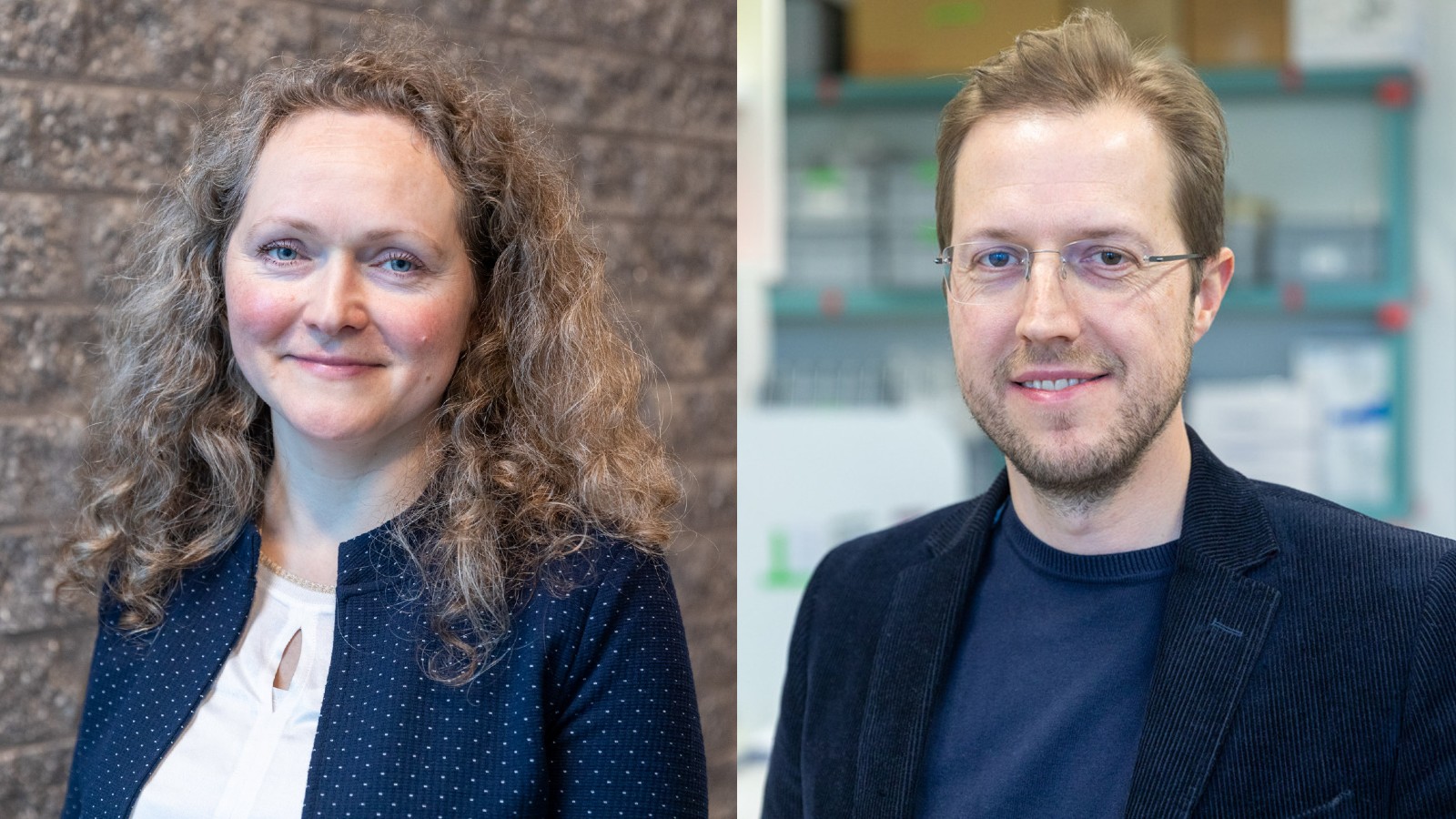Every two years Ammodo gives awards for fundamental research to eight scientists in the Netherlands. This year Stan Brouns and Tatiana Filatova were winners.
Tatianana Filatova (left) and Stan Brouns both win EUR 350,000 for their fundamental research. (Photo: Ammodo)
Ammodo is a foundation in Amsterdam that encourages developments in art, science and architecture. Some of the awards, worth EUR 350,000, are for practitioners of fundamental research who are mid-way through their careers. Eight awards are shared among biomedical sciences, culture, natural sciences, and social sciences every two years. Through its monetary awards, Ammodo enables researchers to explore new directions in their area of work. Two of the eight laureates of the Ammodo Science Award for Fundamental Research 2023 work at TU Delft. Two previous TU Delft winners of Ammodo Science Awards were Ronald Hanson (2015) and Stephanie Wehner (2019).
Dr Stan Brouns (Faculty of Applied Sciences) works on the battle between bacteria and viruses (bacteriophages). And by extension, on the CRISPR-Cas system through which bacteria defend themselves against viruses. The CRISPR-Cas mechanism is currently the most important tool for genetic modification. Brouns also works on using bacteriophages as an alternative to antibiotics, which is losing ever more ground.
‘I am very happy with the award,’ responds Brouns. ‘I will think about a good project this year, but part of the award money will go to supporting the Phage Library.’ The Phage Library, that Brouns has been working for some years, systematically collects bacteriophages and charts their antibacterial activity.
- Delta wrote about his research before: Phage Library wants to clarify bateriophage effects
Prof. Tatiana Filatova (Faculty of Technology, Policy and Management) is an economist and studies the exchange between climate change and socio-economic systems. In doing so, she tries to predict the responses of society to different climate scenarios. ‘What distinguishes Filatova’s work is that her research uses existing knowledge of social sciences to enrich traditional climate models’, writes the jury. ‘Her computer simulations show that poverty traps and ghettoes can emerge in climate sensitive areas, including in the Netherlands.’
‘I am considering using it to bring the research to a new level’, writes Filatova, ‘actually at the crossroads of my ERC & VIDI projects. I still need to plan carefully but the direction I am thinking about concerns the use the novel data on household adaptation behavior collected within ERC and the development of a new generation of reusable open access modular computer simulations that mimic how people make choices when facing climate-driven risks.’
- Delta recently reported on her study in Ecological Economics on the (positive) impact of the ‘Room for the Rivers’ programme on the price of adjacent housing.
Controversial fund
Ammodo, founded in 2011, promotes art and science. In 2014, six professors raised concerns about it in the NRC newspaper. They believed that the KNAW (Royal Netherlands Academy of Arts and Sciences), that collaborates with Ammodo, should distance itself from Ammodo as the foundation’s capital, worth EUR 1 million, was misappropriated from a stevedores’ pension fund. The case was brought to the High Court and discussed in the House of Representatives. A settlement was ultimately reached, but the six professors were not happy with this.
In 2014, the KNAW saw ‘no impediments for the Board of the KNAW to enter into a partnership with the Ammodo Foundation’. In the meantime, the KNAW name is no longer associated with the award. When asked, a KNAW spokesperson responded with: ‘We were more closely involved in two award events, and for another two we only did the nomination and selection. The withdrawal of the KNAW is largely connected to its policy in recent years to limit our input in academic awards to our core tasks. We also did this with other awards such as the Heineken Awards. The ties were completely broken this year, and the award has also changed in character. There are still several KNAW members in juries, but they do this under their own name.’
Are the laureates aware of this history? Brouns writes: ‘I read about the controversy, but we understood from the organisation that the pension fund issue is closed for both sides.’
‘All recipients, including me, are aware of the issue’, writes Filatova. ‘The article you refer to was published almost 10 years ago and relates to an issue that has been positively settled between Inphykem and the port stakeholders in the beginning of 2010. Since then the foundation was restructured and Ammodo is open about it on its website.’ (Dutch only)
- For more information about the award, see ammodo-science-award.org.
Do you have a question or comment about this article?
j.w.wassink@tudelft.nl


Comments are closed.